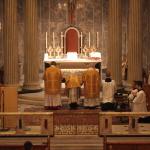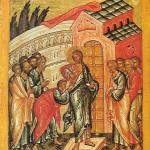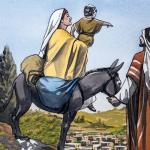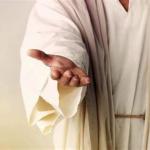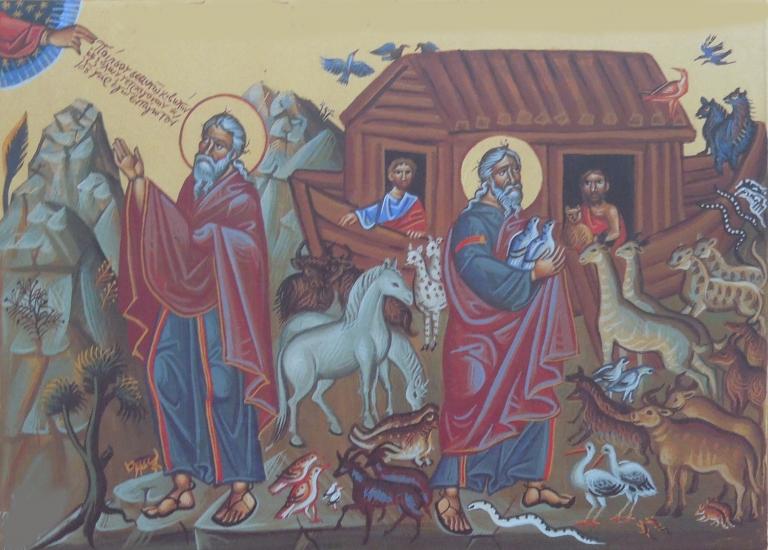
Come, O faithful, let us climb the Mount of Olives with the apostles, let us lift our minds and hearts on high. Let us behold the Lord as He is taken up. Let us cry out with joy and thanksgiving. Glory to Your ascension, O most holy one. (Aposticha for Ascension Thursday).
The meditation of the Kyivan Church on this second of the Mission Days begins curiously: ‘Human beings today are deeply concerned how they are viewed by others. However, Christians follow Christ and do not care what the world thinks of them.’ This insight opens into a treatment of how sin works, that a person ‘prefers that there be no God’ and then descends into personal paralysis and political unrest.
The point of today’s meditation, in other words, is that there is something in the Ascension of our Lord and our evangelical journey to Pentecost that is about liberation from sin. But the strange thing is that the Gospel passage assigned for today does not even talk about sin. Instead, it continues from the point where we left off yesterday in the Lord’s Farewell Discourses while he is at table with his disciples before going to be betrayed in the Mount of Olives. Jesus is talking about the Holy Spirit, the Paraclete, whom he will send to live with us throughout the age. The only indication that the Spirit will contend with sin is that ‘the cosmos cannot receive because it neither sees nor knows it’ (John 14.17, David Bentley Hart translation).
The meditation goes on. The Kyivan Church speaks of the illumination of the Holy Spirit, in which ‘a person undergoes deep changes’ and ‘God ceases to be an enemy and becomes Light.’ Quoting Metropolitan Andrey Sheptytsky, the Church wants us to know that ‘what an inexhaustible treasure this is, what a wonderful heavenly gift, what happiness it is to be a Christian!’ The Holy Spirit has brought us from darkness into light.
But what is this darkness from which the Spirit liberates us? We learn again from the simple acts that the Kyivan Church prescribes that it usually begins from the intimate level. Often, we do not know what it is, so we are asked to ‘make an examination of conscience using the catechetical part of our prayer book, and thank God for the gift of liberation of sins, granted especially through Confession.’ Here, the Church assumes two things: that we have a prayer book with which we can examine our conscience and that we are regular penitents at the Holy Mystery of Repentance. She goes on to say that we should ‘establish the practice of a daily forgiveness of offences’ in our family, that we should ‘resolve’ to seek the forgiveness of anyone we have wroned and ‘to forgive anyone who may have wronged me,’ and that these practices should even apply to the Internet: ‘There is no one without sin. Today-tomorrow, whomever we meet in person, whoever catches our attention in social media, let us seek to look at each person through the eyes of God, as someone whom the Lord wishes to save.’
Here, we learn what the darkness is. It is the insight with which the Kyivan Church began today’s meditations: that we often are self-absorbed, concerned only about what others might think about us. This is the way of the cosmos, a world that encourages this self-absorption. Indeed, the theorist Byung-chul Han says that the whole point of social media is to create a kind of mirror where we police our own behaviors in comparison with others. And yet, the Church invites us through the power of the Holy Spirit to break the mirror, to get out of the self turned inward on itself to see the other, to love someone who is not me, to be able to see G-d himself as Light instead of an enemy who gets in the way of – let’s get a little psychoanalytical here – the masturbatory proclivities of a world turned inward on itself.
Indeed, this insight is what I learned from a spiritual direction session before I became Catholic from a priest that I later discovered was Byzantine. After telling him of many of my personal struggles, he remarked that they all seemed interconnected. It seemed that at the end of the day, I as a young academic was struggling with what he called ‘selling out to the system.’ What that would mean is that instead of seeing other people in the academy as persons who are made in the image of G-d, I am tempted to become self-absorbed and to use them as things instead of icons of Christ himself. Here, sin is both personal and systemic. I am the one selling out, but the master who tells me to be self-absorbed is a system, the ‘cosmos’ in today’s Johannine passage. As a spiritual exercise, he told me to go to the church and spend fifteen minutes there praying for everyone in my life who was in danger of selling out to the systems in their lives, whether academic or not. That was a transformative moment for me and probably sent me rather far down the road to Eastern Catholicism, now that I think of it. There, I was praying for both myself and everyone else whose existence was determined by what others thought of us. But by the grace of the Spirit, the Paraclete who opens our eyes, we come to see the Lord who is Light and therefore each other as his icons – or as in the words of Holy Macarius the Great, ‘all light, all face, all eye.’
Today is the second of ten Mission Days in the Kyivan Church from Ascension to Pentecost.

